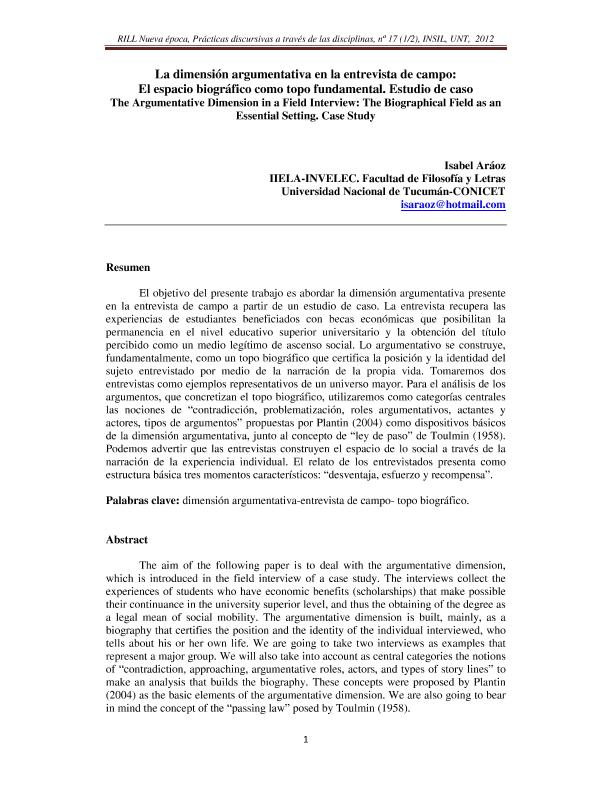Mostrar el registro sencillo del ítem
dc.contributor.author
Aráoz, Isabel

dc.date.available
2018-10-05T21:40:37Z
dc.date.issued
2012-04
dc.identifier.citation
Aráoz, Isabel; La dimensión argumentativa en la entrevista de campo: el espacio biográfico como topo fundamental: Estudio de caso; Universidad Nacional de Tucumán. Facultad de Filosofía y Letras; RILL Nueva Época; 1-2; 17; 4-2012; 1-22
dc.identifier.issn
2250-6799
dc.identifier.uri
http://hdl.handle.net/11336/61835
dc.description.abstract
El objetivo del presente trabajo es abordar la dimensión argumentativa presente en la entrevista de campo a partir de un estudio de caso. La entrevista recupera las experiencias de estudiantes beneficiados con becas económicas que posibilitan la permanencia en el nivel educativo superior universitario y la obtención del título percibido como un medio legítimo de ascenso social. Lo argumentativo se construye, fundamentalmente, como un topo biográfico que certifica la posición y la identidad del sujeto entrevistado por medio de la narración de la propia vida. Tomaremos dos entrevistas como ejemplos representativos de un universo mayor. Para el análisis de los argumentos, que concretizan el topo biográfico, utilizaremos como categorías centrales las nociones de “contradicción, problematización, roles argumentativos, actantes y actores, tipos de argumentos” propuestas por Plantin (2004) como dispositivos básicos de la dimensión argumentativa, junto al concepto de “ley de paso” de Toulmin (1958). Podemos advertir que las entrevistas construyen el espacio de lo social a través de la narración de la experiencia individual. El relato de los entrevistados presenta como estructura básica tres momentos característicos: “desventaja, esfuerzo y recompensa”.
dc.description.abstract
The aim of the following paper is to deal with the argumentative dimension, which is introduced in the field interview of a case study. The interviews collect the experiences of students who have economic benefits (scholarships) that make possible their continuance in the university superior level, and thus the obtaining of the degree as a legal mean of social mobility. The argumentative dimension is built, mainly, as a biography that certifies the position and the identity of the individual interviewed, who tells about his or her own life. We are going to take two interviews as examples that represent a major group. We will also take into account as central categories the notions of “contradiction, approaching, argumentative roles, actors, and types of story lines” to make an analysis that builds the biography. These concepts were proposed by Plantin (2004) as the basic elements of the argumentative dimension. We are also going to bear in mind the concept of the “passing law” posed by Toulmin (1958). These interviews build the social space through the narration of the individual experience. The accounts of the people interviewed present three typical moments which are introduced as the basic structure: “disadvantage, effort and reward”.
dc.format
application/pdf
dc.language.iso
spa
dc.publisher
Universidad Nacional de Tucumán. Facultad de Filosofía y Letras

dc.rights
info:eu-repo/semantics/openAccess
dc.rights.uri
https://creativecommons.org/licenses/by-nc-sa/2.5/ar/
dc.subject
Dimensión
dc.subject
Argumentativa
dc.subject
Topo
dc.subject
Biográfico
dc.subject.classification
Estudios Generales del Lenguaje

dc.subject.classification
Lengua y Literatura

dc.subject.classification
HUMANIDADES

dc.title
La dimensión argumentativa en la entrevista de campo: el espacio biográfico como topo fundamental: Estudio de caso
dc.title
The Argumentative Dimension in a Field Interview: The Biographical Field as an
Essential Setting: Case Study
dc.type
info:eu-repo/semantics/article
dc.type
info:ar-repo/semantics/artículo
dc.type
info:eu-repo/semantics/publishedVersion
dc.date.updated
2018-09-24T14:13:06Z
dc.journal.volume
1-2
dc.journal.number
17
dc.journal.pagination
1-22
dc.journal.pais
Argentina

dc.journal.ciudad
San Miguel de Tucumán
dc.description.fil
Fil: Aráoz, Isabel. Consejo Nacional de Investigaciones Científicas y Técnicas. Centro Científico Tecnológico Conicet - Tucumán. Instituto de Investigaciones sobre el Lenguaje y la Cultura. Universidad Nacional de Tucumán. Facultad de Filosofía y Letras. Cátedra de Literatura Argentina. Instituto de Investigaciones sobre el Lenguaje y la Cultura; Argentina
dc.journal.title
RILL Nueva Época
dc.relation.alternativeid
info:eu-repo/semantics/altIdentifier/url/http://www.filo.unt.edu.ar
Archivos asociados
